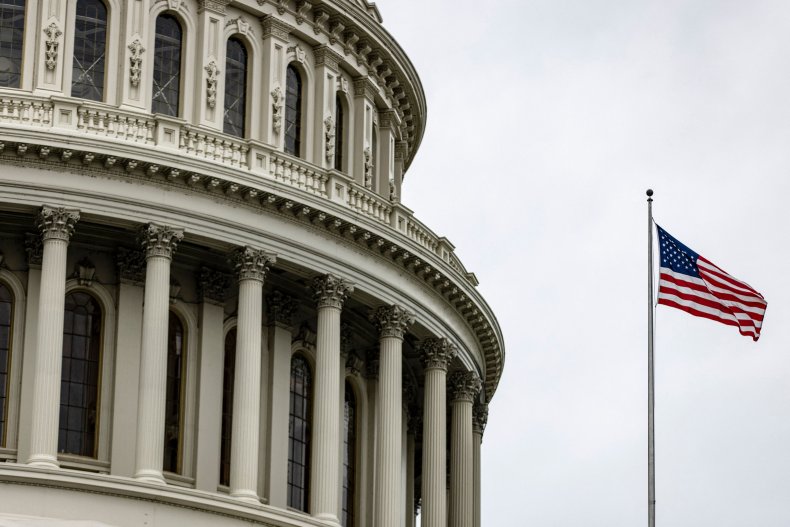Here's How We Unite America After the Pandemic | Opinion
As we begin to see what life will look like without the coronavirus, most Americans are reverting their anger back at each other. We've replaced diversity of thought based on reason with the tyranny of self-righteousness based on impulse. This is our greatest threat—more than Chinese expansionism, Russian aggression, global pandemics, economic stagnation or even climate change.
Growing up in Pakistan, a nuclear-armed country ruled by the military for most of its existence, the costs of division were visible everywhere—in the slums of Karachi, where Sindhis and Balochis that toiled in the factories by day slept the night in staggered rows in huts without running water when many Punjabi elites seemed to get jobs and buy houses they desired.
A common joke went that "countries have armies, but in Pakistan the army has a country." The truth was that we were oppressed by the false unity the army liked to trumpet, co-opting Islam in a desperate but unsuccessful attempt to forge a sense of national spirit. I never had the liberty of thought to examine the military's failed wars, or ask why Shiites and Christians were persecuted, or why we had to hate India unquestionably.
Down to the level of the public education system, the regime had calculated that if we hated India—and if we did not acknowledge our sins like the gruesome civil war of 1971 that killed thousands of Bengalis—we could hate each other less. In erecting common enemies, the reasoning seemed, our sectarian differences could fade away. They never did.
I came to America, and for all its shortfalls and paradoxes of democracy laced with racial injustice and perpetual wars, I tasted liberty to disagree for the first-time. Spending over two decades in the United States, I learned that the strength of America comes from acknowledging that our most dangerous passions can only be tamed—and our greatest feats achieved—when we have the courage to accept liberty that sings and stings.
Liberty comes naturally—almost easily—when we surround ourselves with those that agree with us. They like the same sports teams and political parties, they grow up in cities we recognize, with gods we worship, with names we can pronounce and with shared dreams and troubles, perhaps even the same biases.
But liberty also stings, hurts and feels unnatural when our Constitution asks us to respect and defend those that disagree with us. In recent times, we have been taught to detest these so-called opponents.
When I became a citizen, I embraced the motto "out of many, one." I wanted to pay my debt, so I joined the Navy in 2014 through the U.S. Military's Direct Commission Officer program. As the first week of basic training ended steeped in Naval history, dead-man floats, Anchors Aweigh marches and making the perfect bed—our commanding officer announced that we would be on break for 24 hours. "Make sure you have a shipmate with you at all times," he said, "including Sunday services."
I remember glancing at the sailors around me, wishing I might have someone to join me, but knowing I was the only Muslim.

The commander pointed in the direction of the church on the base and the synagogue outside. He noticed my lost look and told me there was a mosque close by. "If you want to go but can't find a shipmate, or don't have transportation," he said, "let me know—I'll make sure someone takes you."
I knew then that America was home—my liberty was singing while for some that liberty was stinging, yet both were protected by law.
America is not perfect—not by a long stretch—but it wants to be. What makes this nation exceptional is the acceptance that divisions among us—tempered and nurtured by our constitution—make us freer than the rest. Not only is it okay to disagree, it is encouraged.
This liberty to disagree under the Constitution is so important that those of us in the United States military defend it with our very lives.
In recent months, foreign adversaries and domestic insurrectionists have exploited that belief, challenging us to give it up. Often using value-blind emotive vortexes of information, they replace civil debates with incendiary conjecture and calls for rebellion.
We can fight the cancer of disinformation by developing public-private partnerships to include technology companies, news outlets, universities, think tanks and Congress and find fact-based common baselines of reality that balances our liberty and security. Whether a moviegoer has the right to shout "fire" in a crowded theater is not determined by the theater owner, but by our courts, and neither should social media companies be asked to legislate free speech in the long-term, no matter how noble the intention or dangerous the content.
We've successfully made similar reforms across safety, privacy and national security issues. We placed seatbelts in cars, registered domains on the internet, permitted the commercial use of GPS satellites to boost our economy and unlocked new powers of transparency through the Freedom of Information Act, which directs the responsible release of government documents, all making us safer and strengthening our democracy. All of these initiatives balanced public-private, state-federal and individual-society equities and were supported by Republicans and Democrats.
Today most Americans agree on revamping our human and physical infrastructure, strengthening our electoral system, a path to citizenship for most undocumented immigrants, creating jobs to fight climate change, preparing for the next pandemic and preventing China and Russia from overturning the American-led international order.
I reject the notion that Americans are permanently divided, that our differences are too sharp, our ideas too varied, our allegiances too suspect and our common Americanism more myth than reality. America is not a myth, but rather a project, whose imperfections are a call to make it better.
Haider Ali Hussein Mullick, PhD, a U.S. Navy Reserve Officer in the U.S. Global Response Force, teaches international security at Georgetown University.
The views expressed in this article are the writer's own.


